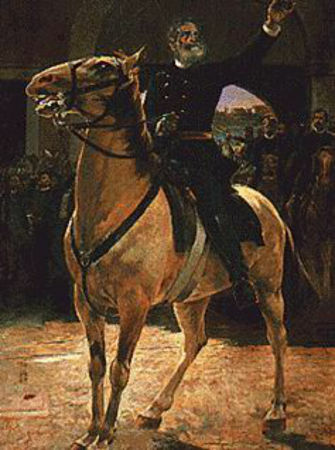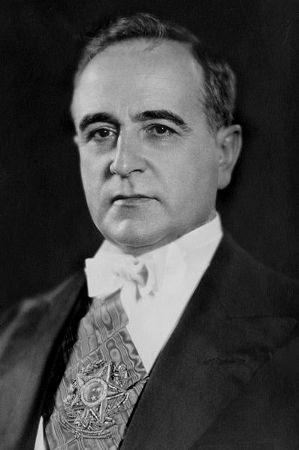Since Independence, in 1822, which gave Brazil the character of a politically autonomous and sovereign nation, our country went through several periods of turmoil. Among the factors that conditioned such turmoil, we had: revolts, coups d'état, coup attempts and resignations. This text deals with this last topic. In all, we had five resignations by heads of state in Brazil.
1) 1831: Dom Pedro I

Dom Pedro I abdicated the throne in 1831, bequeathing power to his son, Pedro de Alcântara
The first head of state we had, D. Peter I, he was also the first to resign his post. But since he was emperor, the resignation was called abdication. D. Pedro I abdicated the throne in favor of his son, Pedro de Alcântara (future D. Pedro II), on April 7, 1831. Many problems of a political nature (such as the growing liberal opposition to the emperor) and economic (the Banco do Brasil was closed at that time) contributed to the monarch's abandonment of the post. More details can be seen.on here.
2) 1891: Deodoro da Fonseca
O Marshal Deodoro da Fonseca helped trigger the coup d'état against the monarch Dom Pedro II, even though he was very reluctant to do so, since he had been, in addition to being a convinced monarchist, a personal friend of the emperor. The fact is that after theNovember 15th, Deodoro came to command the country as interim president, until a constituent Assembly and if it approved a new Constitution for the country to seal the republican institutions once and for all. This took place in 1891. With the new Constitution promulgated, Deodoro was indirectly elected president of Brazil, with a four-year term, with another marshal as vice-president, florianofish.
Deodoro's government was marked by tensions with the National Congress, arising from problems such as the nomination of the monarchist Baron Lucena to Ministrygivesfarm – which constituted an affront to the Republican congressmen – and the lack of ability (given their authoritarianism) to deal with the economic crisis that the country was experiencing and with the coffee-growing agrarian elite.

Deodoro da Fonseca was forced to resign as president of the Republic in 1891
Congress's reaction came with the bill called Law of Responsibilities, whose purpose was to limit the powers of the president. Feeling threatened by Congress' reaction, on November 3, 1891, Deodoro staged a coup, closing Congress and declaring a State of Siege. Many oppositionists were arrested, among them the future presidents of the Republic, Prudent of Morals and Sales Fields.
In response to the coup, the then armedBrazilian, that, among its members, there were still many monarchists, it threatened to bomb with its ships the city of Rio de Janeiro – seat of the government – if Deodoro didn't resign. Cornered, Deodoro resigned from the presidency on November 23, 1891, being succeeded by Floriano Peixoto.
3) 1945: Getúlio Vargas
Getulio Vargascame to power in Brazil in 1930 through a coup d'état against the presidency of São Paulo Washington Luis. His government went through a provisional, democratic and dictatorial stage. At the end of 1945, under the threat of another coup, this time against him, Vargas was forced to resign.
Vargas' dictatorial phase, called “new state”, coincided with the time of the Second World War. Vargas played a double political game at the time. He adopted a totalitarian leader profile, inspired by the nazi-fascism in hitlerand Mussolini,but when the war came to a head, after the definitive entry of the US, Vargas was forced to break with fascism and give support to the allies.
With the Allies winning the war, in 1945, the anti-democratic fascist regime model adopted by Vargas fell into disrepute. The then president began to be pressured by other countries to promote a transition to democracy. However, Vargas wanted to remain in power, even if the form of the regime changed. As he no longer had the military on his side, he linked up with other bases, especially with the political left.

Vargas had to resign from office in 1945
O Brazilian Communist Party had come out of hiding and tried to liaise with Vargas to create a new Constituent Assembly and guarantee its permanence in power, forming the so-called “queremism”, or queer movement. Added to this fact was the arbitrary action that Vargas took against João Alberto Lins, removing him from the head of the Federal District police – a strategic position in the period – and replacing him with his brother, Benjamin Vargas, considered authoritarian and truculent.
These actions by Vargas provoked the reaction of General Góis Monteiro, who had helped to make the 1930 revolution. Góis Monteiro mobilized his troops to the Federal District, threatening a coup. The Minister of War, EuricogasparDutra, to avoid a civil war, he proposed a waiver agreement with Vargas. In return, the president would not have his political rights revoked nor would he need to go into exile. The agreement was accepted and the president took refuge in his hometown, São Borja, in Rio Grande do Sul.
4) 1961: Jânio Quadros
Jânio da Silva Quadros he won the 1960 presidential election. He had an ambiguous political stance, which mixed liberal and conservative discourse (supported by National Democratic Union, a UDN) with left-wing populism. After assuming the government, this ambiguity became even more notorious, as he started to promote acts extravagant, such as the ban on wearing bikinis on the beaches, and controversial, such as the revolutionary award Argentine Ernesto “Che” Guevara with the Order of the Southern Cross, the highest decoration of the Brazilian State.
In economic policy, Jânio tried to fight the inflation he had inherited from the government of juscelinoKubitschek by freezing prices and wages and restricting credit, which provoked a strong reaction from the people and the opposition.

Jânio Quadros resigned seven months after he took office, in 1961
A part of the UDN was deeply opposed to the Janio government, especially Carlos Lacerda, governor of the State of Guanabara at the time. Carlos Lacerda also owned the newspaper Press Tribune, which started to attack the government of Jânio more and more. On August 24, 1961, Lacerda made a public statement, via radio, in which he denounced an alleged coup attempt articulated between Jânio and his Minister of Justice, Oscar Pedro Horta.
This denunciation was never confirmed, but the fact is that Jânio resigned as president a day after Lacerda's statement. In his resignation, it can be read:
I was defeated by the reaction and so I leave the government. In these seven months I have fulfilled my duty. I have done it day and night, working tirelessly, without prevention or grudges. But my efforts to lead this nation, which on the path of its true political liberation and economic, the only one that would enable effective progress and social justice, to which its generous people are entitled.
5) 1992: Fernando Collor
The carioca living in Alagoas, Fernando Collor de Mello, was elected president of the Republic in the 1989 elections – the first direct elections for president after the Military regime. In 1992, after being accused of involvement in a corruption scheme by his brother, PeterCollor, in the magazine Look!, had a process of impeachment opened against him in the National Congress. The corruption scheme in question was run by the one who had been the treasurer of Collor's campaign, Paulo Cesar Farias, aka PC Farias.
The accusation against Collor added to his inability to remedy the economic and financial problems inherited from the government of José Sarney, as well as dealing with members of the Chamber of Deputies and the Senate, who, little by little, were leaving the base of the government. The result was the advancement of the process of impeachment, which was finally judged in the Senate, on the day December 29, 1992.

Demonstration in the Três Poderes square in favor of the impeachment of Collor *
That same day, before the trial session began, Collor sent a letter of resignation to the presidents of the Senate and the Federal Supreme Court, which was read by the lawyer. José de Moura Rocha. The country was then officially without a President of the Republic. The deputy, Itamar Franco, was supposed to take office on the same day, but the Federal Senate decided to proceed with the impeachment, and so it was done. Collor had his political rights revoked by the vote of 76 senators. There were a total of 79 present.
* Image credits: Image bank of the Senate / Federal Senate Agency
By Me. Cláudio Fernandes
Source: Brazil School - https://brasilescola.uol.com.br/historiab/cinco-renuncias-chefes-estado-no-brasil.htm
